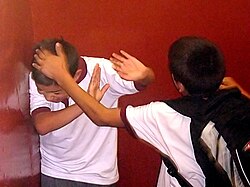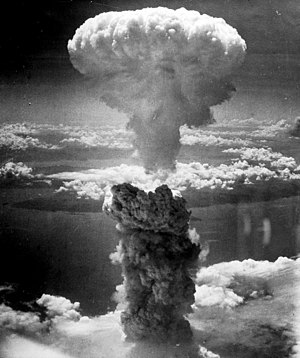Aggression
Appearance
(Redirected from Impulsive aggression)
| Subject classification: this is a psychology resource. |
| Completion status: this resource is ~25% complete. |
This page is intended to help people to learn about the psychology of aggression. Feel free to contribute.
Aggression is a behavior aimed at harming others physically or psychologically. [1]
Examples
[edit | edit source]This section provides some examples of different types of aggression. Feel free to discuss each one further and also to create new examples. discussed further.
Cyberbullying
[edit | edit source]

Fighting
[edit | edit source]
Rioting
[edit | edit source]
Genocide
[edit | edit source]
Foto Sascha Grabow

Social learning
[edit | edit source]
Street fight
[edit | edit source]
War
[edit | edit source]
References
[edit | edit source]- ↑ "Aggression". APA Dictionary of Psychology. Retrieved August 8, 2020.
See also
[edit | edit source]| Search for Aggression on Wikipedia. |
Wikimedia Commons has media related to Category:Aggression.
- Aggression keywords
- Aggression (Lecture)
- Prejudice
External links
[edit | edit source]Girard's mimetic/scapegoating model of community violence
[edit | edit source]- Thinking About Violence In Our Schools (Kort & Williams; musenet.org)
- Cogitating About Communication In Our Connectedness (Kort; musenet.org)
- Worrying About Wheel-Warring In Our WikiWoe (Moulton; wikipediareview.com)
